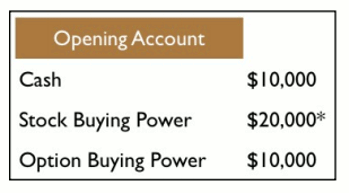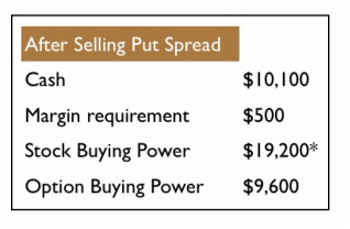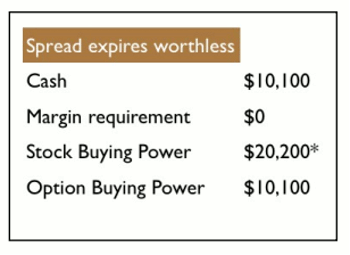Just because something is labeled as a credit, it doesn't mean that you're receiving any money, says Greg Loehr of OptionsBuzz.com.
Say "income trade" and what comes to mind? Probably a credit trade of some kind; maybe a short put spread, or an iron condor. But with this "credit" trade, are you actually receiving any money? Well, I guess that depends on your de?nition of "credit."
The dictionary that comes built-in with my MacBook de?nes a credit as:
"An entry recording a sum received.... The opposite of debit. A payment received...."
I would further clarify this de?nition to say "A payment received which doesn't require paying out an even bigger sum." Otherwise, what's the use? If the bank credits my checking account, I have more money. If I receive a credit during the closing of my new house, then the credit reduces the cost of the transaction.
But when I sell a put spread for a credit, I'm not receiving money; I'm actually making a payment. Here's how it works.

Let's say you open an account with $10,000 in cash. You can withdraw all of the money. Or you can put all of that $10k into options if you wanted; this is called your "option buying power" (OBP). Or, assuming your broker has given you the ability to buy stock on 50% margin, you could buy $20k of stock. The amount of money you can withdraw from your account is equal to the amount of money you do not have at risk, which is your OBP.
Now, in an effort to create income from this money, you sell a $5-wide OTM put spread for a credit of $1.00. Has the credit put money into your account? The answer is no, even though it might look like it.
The cash has gone up, but something new has appeared, and that's the margin requirement. This is the amount of money the broker sets aside to cover the risk of your trade. Some brokers may call this a "sub-account."

You sold a $5.00-wide spread, which has a maximum value of $5.00. So the broker takes $500 from your option buying power to cover the maximum value of the spread, reducing it to $9,500. Then, the $100 is credited to your cash, which in turn raises your option buying power by $100 to $9,600.
Your stock buying power, with 50% margin, is $19,200, which is twice your OBP.
In short, your option buying power has been reduced by the amount of the risk in the trade. Therefore, selling the put spread really acts like a debit trade.
What it really comes down to is this: the amount of money you can withdraw, or put into other trades, gets reduced by the amount of the risk of your trade. Since all opening trades have risk, all opening trades reduce your option buying power, and therefore, are really "debit" trades.
NEXT PAGE: When Do Get the "Income"?
|pagebreak|Think of it this way. I hire you to do a job for which I'll pay you $100 up front. But at the same time you have to pay me $500, which I'll hold as a deposit just in case you don't do the job correctly. Do the job right, and you'll get your deposit back. Did you get $100 up front? Or did you really pay out $400 at the start. I think in only the most twisted sense of the word "credit" would you say you received money.
What about earning interest on the credit? Yes, you're going to earn interest on your credit of $1.00. But you're not receiving interest* on the $5.00 margin requirement, so you're giving up interest on $4.00, which again, is the risk of the trade.
There is no "income" in an "income" trade until two things happen:
1. You give the broker money to place a trade.
2. You close the trade for
a pro?t.

That pro?t, regardless of whether it came from a "credit" trade or a "debit" trade, represents your income.
Once the trade is closed, and for this example let's say the put spread expired worthless, then the $500 margin requirement is released back to the OBP, and now you get to spend your $100 income.
If you've ever heard other traders discuss credit spreads and say things like:
"I like to get my credit up front."
"I receive my pro?t up front."
"I
like to get paid to put on these trades."
...then you now know these statements are all false, or at the very least incredibly misleading. Just because something is labeled as a credit, it doesn't mean that you're receiving any money. It's kind of like that email I keep receiving from the Nigerian Prince that offers to cut me in on his inheritance if I ?rst wire him $2,000 to cover the costs.
Once you accept that the iron condor you sold for a $1.00 credit is really a debit trade, then the world of "income trading" opens up to many other different kinds of strategies.
This now lays the framework for what we'll explore in the second installment of this piece. We'll look at using the weeklies in particular. And we'll also start looking at 'income' strategies that can be a little more forgiving when the market moves against you and it's time to adjust.
*I know interest rates are at zero, but technically speaking you should receive at least some amount of interest on your money.
By Greg Loehr of OptionsBuzz.com










